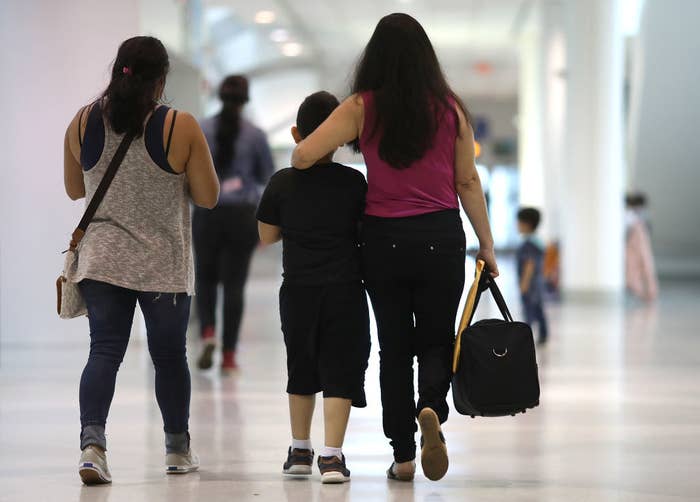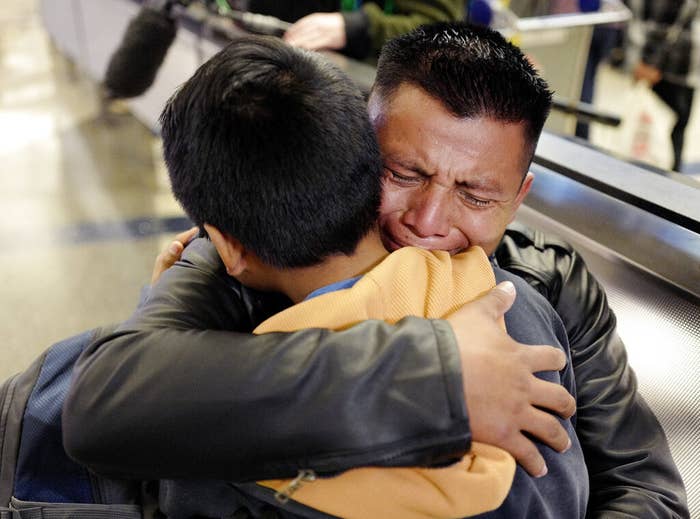
In the nearly four years she spent away from her sons in El Salvador after being separated at the border by the Trump administration, Lisy would dream of being able to hold them again. That day finally came last month through the work of a government task force, but the joyful reunion was quickly overshadowed by her inability to financially provide for her family.
Since being separated from their mother in fall 2017 by US border authorities, the two brothers, who were 5 and 10 years old at the time, had been raised by an older sister and her husband. Lisy is living with them now, but she said she's expected to pay for their school supplies and clothes; additionally, her son-in-law told her she’d need to contribute to the rent soon despite not being able to work.
"I'm very grateful for being allowed into the country and being reunited with my sons," Lisy told BuzzFeed News. "But as much as it pains me to ask, I need help."
Lisy, who asked to be identified by a pseudonym because she doesn't want to jeopardize her ability to stay in the US with her sons, is not alone in her financial problems. The Biden administration's family reunification task force, charged with locating and facilitating the reunifications, has encountered several challenges along the way, according to government documents obtained by BuzzFeed News.
So far, families from the first group of reunifications have reported homelessness shortly after entering the country, according to the documents. Axios first reported that at least one-third of about 41 previously separated immigrant families experienced homelessness after being reunited.
To help solve the problem, the task force wants the Department of Health and Human Services to offer resettlement services for families, including English classes, money, and medical assistance. But it's unclear, according to the documents, whether the government has the authority to fund the process. Officials hope the funding would help stop any further “traumatization” of the recently reunified children. “It is critical we find a solution in the near term,” the document states.
The Biden administration identified 3,913 children who were separated from their parents at the southern border as a result of Trump's zero-tolerance policy. Finding and physically reuniting families was made difficult by the lack of a comprehensive tracking system among all government agencies involved. The situation was made worse by numerous errors in the files, such as wrong dates, incorrect names, and duplicated cases, a senior homeland security official told reporters.
In a statement, the Department of Homeland Security said officials are working to ensure reunited families receive the housing and other sources of stability they need.
"As we explore solutions, the Task Force is working with the private sector to provide families we reunify, who were separated under the Trump Administration’s 'Zero Tolerance' policy, with housing when needed," a spokesperson said in a statement.
DHS said the task force started reuniting families through a trial process in order to identify complex challenges. But according to the documents, it's not satisfied with the current reunification pace as it faces challenges identified through the initial group of reunifications.
Along with trying to add services for arriving families, the task force has worked to improve contact and information sharing with separated families. To do that, the task force is working to educate families on the process and has enlisted the US Agency for International Development to find families who may have been separated, according to the document. The task force noted that advocates had told them that separated families were hesitant to come forward and did not have the necessary information to trust the process.
Elsewhere, DHS is working to build a public website for families to self-declare their separation and planning to include an instructional video.
A senior administration official previously told reporters the task force intentionally started the reunification slowly so it could go faster later.
"We took a lot of time to talk to NGOs and representatives of families who had gone through some of the reunification processes in the past that had been very problematic to try to learn from their experience on what was necessary so that we don't retraumatize families," the official said. “It's one thing to do this on an individual basis ... and quite another when you're trying to build a system that will work for many, many more cases.”
The process for reuniting families requires travel documents and permission from both parents to take a child out of their home countries, requiring visits to the capital, time, and resources. The task force is also allowing separated parents and children to bring additional family members, which requires another parole request and verification of familial relationships for a person never encountered by DHS. Finally, the US has to establish a way to pay for the travel costs of the family, which has meant partnering with the private sector to help cover additional family members.
Lisy said being reunited with her sons has been a mixed bag of emotions. She's overjoyed and happy she can see her sons after being separated, an event she doesn't like to remember. But stepping back into an active role as a mother has been hard because she can't provide for her sons.
"It's another trauma because I'm with them and I can't get them the things they need," Lisy said. "I have no job. I have nothing to offer."

Like many reunited parents, Lisy is waiting on a work permit she hopes will turn her situation around. Attorneys and advocates said the work permit process has been accelerated for this group of parents, but it could still be months before they get it and can start looking for jobs.
In the meantime, these families have to figure out how to provide for themselves, said Carol Anne Donohoe, managing attorney for the legal aid organization Al Otro Lado's Family Reunification Project.
"The public sees these parents and children hugging at the airport on the news and have no idea what comes after that," she said.
At first, many of the families are just happy to be with their kids, Donohoe said, but after a couple of weeks, her organization starts getting calls from anxious parents who have to pay rent and buy food and clothes.
"What they want more than anything is to get to work, but they can't without the work permit," Donohoe said. "This administration said family separation was criminal, that these people were harmed, and that their goal was to remedy the harm. I haven't really seen that in action. I'm hearing it, but I don't see it as an imperative."
On Monday, DHS Secretary Alejandro Mayorkas told MSNBC that the family reunification task force had reunited more than 40 families and expects to see that number accelerate in the coming months.
But Donohoe said the task force should have put in some type of safety net so that these families could receive the services they need to establish themselves from the beginning instead of trying to catch up now. Organizations like Al Otro Lado are worried that as more families are reunited, they won't be able to meet families’ needs.
Some families moved in with relatives or friends who took care of their children during the time they were apart on limited income. Now, Donohoe said, these parents are expected to take over the financial responsibility.
"These families are in a really insecure situation and need help, but they're too humble to really ask for it, so we have to think ahead with urgency," Donohoe said. "Letting them into the country is not enough. We have to do what we can to try to make them whole, which may never truly happen given the trauma they experienced."
The financial issues don’t even touch on the mental health needs the families will also need in the long run. One father told Al Otro Lado that his daughter refuses to talk to him because she believed he abandoned her when they were separated by US border authorities.
Each family faces their own unique issues, said Christie Turner-Herbas, director of special programs at Kids in Need of Defense (KIND), an organization that provides legal aid to unaccompanied immigrant children and works with parents separated by the Trump administration.
In the case of one family, the parent who was returning to the US was no longer with the parent whom the children were staying with, Turner-Herbas said. Figuring out where one parent was going to live and how moving out of a home would affect the children is just one of the many issues that separated families have to quickly figure out. Other children might have a hard time accepting their parents back into their daily lives, she said.
"It's an emotional reunion and also one that is very impactful for a child because three years in the life of a child is a large portion," Turner-Herbas told BuzzFeed News. "These parents may have expectations and hopes of how things will go, but really it may be different once the honeymoon period is over."
KIND, along with other nonprofits like Al Otro Lado, has been trying to connect parents with services and financial assistance they need, but they can't provide the kind of wraparound services advocates are calling on the government to fund, Turner-Herbas said.
Some organizations have been providing gift cards for groceries and rental assistance, or at the very least connecting them with food banks and organizations that can help with housing and clothes.
"It's really astonishing to think of all the work a handful of legal providers have been doing all this time," Turner-Herbas said. "But we can't provide everything these families need right now."
Lisy, the mother from El Salvador, said it pains her to say no when her sons ask for chocolate or a hamburger. She's especially stressed about the coming school year and how she'll pay for their list of school supplies and replace the shoes they've outgrown.
Lisy hopes they'll never have to go back to El Salvador, where gangs tried to kidnap her son to work for them when she failed to pay a weekly extortion.
"I really would like to get to work so that I can give my kids a future," she said. "I want them to study and make something of themselves here because there is nothing for them in my country."

